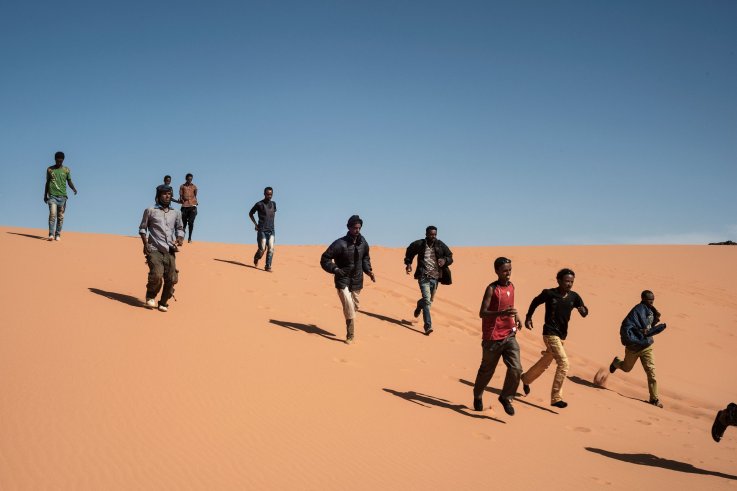A Panoramic Portrayal of Mediterranean Refugees

"Harraga" is an Arabic word meaning "those who burn" or, in its modern context, a migrant who travels without papers, one who "burns borders." Specifically, the term refers to the North African refugees who have been forced to flee their war-torn or famine-reduced native lands.
Harraga is also the name of a new book by Italian photojournalist Giulio Piscitelli, who from 2010-2015 documented the struggle of refugees attempting to emigrate from Africa into Europe. Piscitelli's photos offer a stunning, 360-degree perspective of the plight of these desperate travelers, taking readers beyond the headlines to explore the nuances of these journeys taken by the displaced.
"[Immigration] is one of the most complex topics to describe in one article," Piscitelli tells Newsweek. "It is impossible. The problem is creating a wider view of what is happening. If a person reads about Syrian refugees escaping from the war, and just see the cross of the Balkans, but never read about what's happening Aleppo, they can't understand why there people were forced to flee. My point of view was trying to describe as much as possible, from where these people are beginning, to where they are arriving."
Just as he provides a comprehensive illustration of the physical journeys of refugees, so too does Piscitelli offer a panoramic view of their emotions. There is a rawness, a wildness and an unbridled sense of urgency to many of his photographs, while others portray scenes of solace, quietude and contemplation. The lives the refugees are fleeing can be felt through Piscitelli's work just as strongly as the uncertain future that awaits them.
"There are some pictures that are of impact, but the importance of the project is to dig a little deeper," he says. "A person that is praying inside of a jail built for immigrants seems like a quiet moment, but it's not, obviously. That is the point. We need to focus a little bit more on what is happening. A picture that is important sometimes lacks the necessary quiet moment to reflect about the entire topic."
Piscitelli's favorite picture in the book is from 2011, when he crossed the Strait of Sicily in the Mediterranean with more than 100 Tunisian migrants trying to reach the Italian island of Lampedusa. Each of them paid a smuggler 1,200 Euros for passage. Taken from an elevated vantage point and slightly out of focus, the image shows a frenzy of activity. In the foreground, men move about hurriedly, while toward the back of the boat others sit quietly, resigned to whatever fate the sea has in store. After nearly a full 24 hours of stop-and-start navigation filled with seasickness and anxiety, a seagull is spotted. Land is near. They have arrived. It is only 160 miles from Tunisia to Lampedusa, but for the refugees on board, the journey is far from over.
"The crossing opened my mind about immigration," says Piscitelli. "It's not only a topic about war and famine. Immigration is pushing in our face the lack of possibility of part of the world to travel in a normal way. Me and you can decide from one day or another to go to Iraq to cover a story or just to travel. Someone from Tunisia can't just go to the embassy asking for a visa. The entire work pushes me to think about that. Immigration. Loss. The enormous differences in the right of travel."
Harraga depicts refugees traveling from the Horn of Africa across the Sahara, over the notorious border fence separating Spain from Morocco and through the Balkans; but despite the breadth of Piscitelli's work, he knows that the topic of immigration is a fluid one that can't be contained within any single text. "The book represents part of a project that is ongoing," he says. "It is not complete. The book and the moment represent a comma in a larger discussion. We will see in the future what his happening. It is important to continue to document what is happening."


